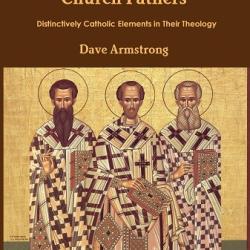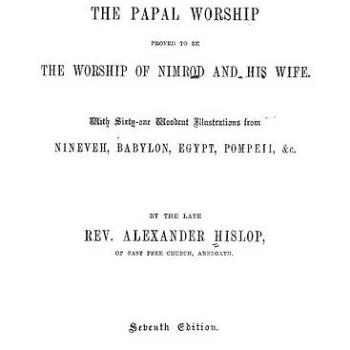Hans Burgkmair the Elder (1473-1531), The Whore of Babylon; sitting on the seven-headed beast, St John and the angel looking on from a cloud in top right corner. From a series of 21 woodcuts of the Apocalypse for Martin Luther’s translation of the New Testament (Augsburg: S. Otmar, 1523) [public domain / Wikimedia Commons]
***
Introduction:
Page 11 – Rod is wrong about the meaning of Sola Scriptura. “Raised in a strong, Bible-believing branch of Protestant Evangelicalism, I was taught to glory in the famous Reformation rallying cry of “Sola Scriptura” – the fiery conviction that the Bible and the Bible alone constitutes the basis for Christian belief.”
This may be the sentiment and mis-understanding that Rod, in his experience, felt, and this is a very common idea about what Sola Scriptura is, but it is incorrect. Rather “Sola Scriptura” says that the Bible is the only infallible rule for faith, doctrine, and practice for the church. It does not say it is the “only” basis for Christian belief; rather it is the “only infallible rule”. So, Protestants believe in secondary authorities that are good and useful, but not infallible, such as local church elders/teacher/pastors/overseers, whose ministry is to teach the Scriptures properly and interpret the Scriptures properly(but we can never claim that any human is infallible); also consulting church history, historical theology, great writers and theologians of the past, ancient creeds, ancient councils, doctrinal statements, good exegetical commentaries.
That’s fine (it’s what I understand the definition of sola Scriptura to be and how I define it in my two books against it); however, Rod may have been using the word “basis” in the sense of “[implied, infallible] rule of faith”. In any event, Rod, on the same page and the next one, acknowledges that the best Protestants did indeed make recourse to history:
Even Luther and Calvin — the very men who taught us Sola Scriptura in the first place — knew and respected these venerable saints whom ancient custom has given the title Fathers of the Church. They quite often used the writings of early giants like Ambrose and Augustine to bolster their various arguments.
Thus, Ken leaves a false impression (by the ever-present selective citation) that Rod thinks Protestantism teaches an absolute, Bible-Only view. This is untrue.
Page 11 – When discussing the various Evangelical groups and churches Rod was a part of, he talks about the Evangelical spirit of always seeking to base things on the pure New Testament Church. He states, “Not one of them had ever sent me back to any first or second-century documentation for evidence.”
But on the same page, what Ken conveniently omits is the sentence immediately before the one above, where Rod also made reference to these groups “whose publicly announced intention was ‘to restore the pure Christianity of the early Church.’ ” Thus he shows that his own experience with Protestantism was not a phenomenon of Bible Only with no Church history whatever (only inadequate particular knowledge of that history). Things must be interpreted in context. Ken ignored the context both before and after Rod’s statement that he knocked down (likely misunderstanding it in the first place). Or he saw the context, but chose only to cite things that give an impression that Ken wishes to create, rather than what Rod actually was trying to express. This will not do. Readers can see through this dubious technique, once it is exposed for what it is.
p. 14 – Seems to imply that the early church fathers were more clear than the Scriptures themselves.
I don’t see that he implied it at all. He commented on the fathers’ “clear, unambiguous teaching . . . the actual doctrine of primitive Christianity set down in black and white.” He made no comparison of that with Scripture. It would be like someone saying, “wow, this river here is so clear!” and someone else concluding that he therefore thought it was clearer than some other particular river. Maybe so, but that can’t be determined by a self-referential statement of that sort. Ken assumes it because it is what he imagines Rod to be saying, according to the usual caricature that Catholics think Scripture is an utter mystery that no one can figure out (I exaggerate some, but not much).
Ken then makes a point about the equivalency of elders and bishops in 1 Clement, claiming that “overseers/bishops (Greek:επισκοποις – episcopois ) is the same office as elders (Greek: πρεσβυτερους – presbuterous).” I already dealt with that argument at length in Part I; also offering various clear New Testament evidences of ecclesiastical hierarchy. No need to reiterate it here, except to note one thing.
He tries to enlist St. Irenaeus in favor of his notion expressed above (Against Heresies, 4:26:5). But elsewhere the saint is very clear as to the primacy and “pre-eminent authority” of the Roman See, with which “every Church should agree”. That sure sounds like a higher level of authority of the Roman bishop in relation to other bishops. He possesses the primacy. The Roman See is preeminent because it was founded by Peter and Paul, and Irenaeus also makes reference to “apostolical tradition” which has been passed down through apostolic succession (cf. 4:26:2). It’s Catholic all-around, and very foreign to a Protestant outlook:
Since, however, it would be very tedious, in such a volume as this, to reckon up the successions of all the Churches, we do put to confusion all those who, in whatever manner, whether by an evil self-pleasing, by vainglory, or by blindness and perverse opinion, assemble in unauthorized meetings; [we do this, I say,] by indicating that tradition derived from the apostles, of the very great, the very ancient, and universally known Church founded and organized at Rome by the two most glorious apostles, Peter and Paul; as also [by pointing out] the faith preached to men, which comes down to our time by means of the successions of the bishops. For it is a matter of necessity that every Church should agree with this Church, on account of its pre-eminent authority, that is, the faithful everywhere, inasmuch as the apostolical tradition has been preserved continuously by those [faithful men] who exist everywhere. (Against Heresies, 3, 3, 2; ANF, Vol. I)
p. 54 – “the church had been preaching the gospel, saving souls, and founding congregations all over the Near East for at least ten years before a single line of the New Testament was written.” While this is technically true, it seems the way it is framed is to make the reader downplay the importance of the written word.
Not at all. That is Ken’s hostile and cynical assumption. When the Catholic makes any point at all about Scripture that is contrary to sola Scriptura, then it is said that they are denigrating the Bible. We’re gonna hear this false charge till Kingdom Come. The Protestant of Ken’s sort can’t seem to grasp that by saying Tradition and Church are also authoritative with Scripture, it’s not required to be “against” Scripture. The fact remains that Tradition and Church played a supremely important role, especially during the period that canonization was still taking place.
For the anti-Catholic Protestant like Ken, in order to truly respect and honor Holy Scripture, one must adhere to sola Scriptura. He acts as if the Bible and sola Scriptura are almost identical, and that no one could possibly respect the Bible without holding to the late-arriving, unbiblical notion of sola Scriptura. But this is completely false and an untrue “equivalence.” That leads to silly statements like the above. The Bible is revered if it is regarded as the inspired, infallible, revelation from God; it’s not required to believe it is the only infallible source of authority (which it itself does not teach, and massively contradicts!) in order to revere it.
Ken then goes on to make trite, inane, rather silly and logically circular arguments about tradition and Scripture. I’m afraid I don’t have the patience to deal with them (having done so many times before), seeing that they are not directly addressing Rod’s arguments. I’ll have to refer readers to my two books on sola Scriptura (one / two), and web page on the same topic.
Clement mentions 1 Corinthians in his letter – 1 Clement 47 . . . Clement quotes from OT and NT passages . . .
Big wow. This is quite a minimalistic statement, and proves little or nothing with regard to the overall thrust of Ken’s argument. What he neglects to tell his readers is that St. Clement of Rome cites, alludes to, or names as authentic, only ten books out of the 27 in the New Testament (Matthew, John, Romans, 1 Corinthians, Ephesians, 1 Timothy, Titus, Hebrews, James, and 2 Peter). See Norman L. Geisler and William E. Nix, From God to Us: How We Got Our Bible (Chicago: Moody Press, 1974), chart on p. 109.
So all of Paul’s letters and for sure the 3 synoptic gospels and Acts were already written by this time, along with 1 Peter. These are almost 30 years before Clement.
Great; I’m absolutely delighted that Ken pointed this out, as it is a great aid to the Catholic argument. Assuming this is true, why, then, Does St. Clement show no knowledge of Mark, Luke, Acts, 2 Corinthians, Galatians, Philippians, Colossians, 1 and 2 Thessalonians, 2 Timothy, Philemon, 1 Peter, and five other NT books? Ken apparently assumes that he does merely because they were already written, but that doesn’t follow. Only the hard evidence of what we know establishes his point, not bald assumptions that because a biblical book exists, therefore everyone in the early Church was aware of it.
Rod seems to emphasize that Clement had nothing to go by except the claim that he was taught by Peter himself and everything was all oral and in their memories and hearts.
No; Rod emphasized that the canon was incomplete, so that Tradition and Church were that much more important as a result. The fact remains that from what we know, Clement knew about or used in his letters, only ten out of 27 New Testament books. That’s not exactly a “grand slam” bit of information for sola Scriptura in the 1st century Church.
p. 62 – “. . . the proud city of Rome must learn to look where Clement looked – to the simple man to whom the Good Shepherd said, “Feed My sheep.” Rod is trying to build the case that the deposit of correct doctrine was in the person of Peter, in his office as bishop of Rome or “Pope”, in Rome, passed on to Clement, and that that was the solution to the problem of disunity and Gnosticism at the time of 1 Clement. Rod seems to imply that Clement is a “living voice” of authority and can solve the disunity problems by commanding obedience.
Absolutely. St. Irenaeus made the same argument some 100 years later, as we have seen. St. Irenaeus always grounded his anti-heretical arguments in apostolic succession and the fact that no heresy could trace its beliefs back to the beginning in unbroken succession. That was sufficient in his mind to prove falsity of the belief, even if biblical argumentation is not yet introduced. The argument is already won against the heretic, by that fact. And it works against Protestants, too, in instances where they hold to doctrines that started in the 16th century and have no pedigree in Church history.
I Clement has a passage that teaches that justification is by faith alone, . . . (1 Clement 32)
Here is a classic case of Ken’s constant technique of citing one aspect of a thing while ignoring other equally relevant passages that contradict his assertion based on the half-truth presentation that he thinks is compelling. It’s cute and amusing but intellectually detestable. In the same book it’s stated: “For her faith and hospitality Rahab the harlot was saved” (12:1). That ain’t faith alone. It’s faith and hospitality (a work) leading to salvation. And again, St. Clement shows an emphasis not unlike St. James:
Let us therefore cleave unto those to whom grace is given from God. Let us clothe ourselves in concord, being lowlyminded and temperate, holding ourselves aloof from all back biting and evil speaking, being justified by works and not by words. (30:3)
Keeping God’s ordinances and commandments is directly tied to salvation (just as it is at least 50 times in the Bible):
Receive our counsel, and ye shall have no occasion of regret. For as God liveth, and the Lord Jesus Christ liveth, and the Holy Spirit, who are the faith and the hope of the elect, so surely shall he, who with lowliness of mind and instant in gentleness hath without regretfulness performed the ordinances and commandments that are given by God, be enrolled and have a name among the number of them that are saved through Jesus Christ, through whom is the glory unto Him for ever and ever. Amen. (58:2)
So much for that silly argument . . .


















